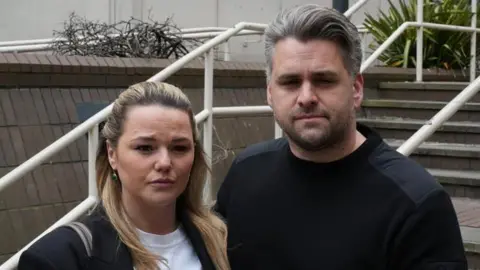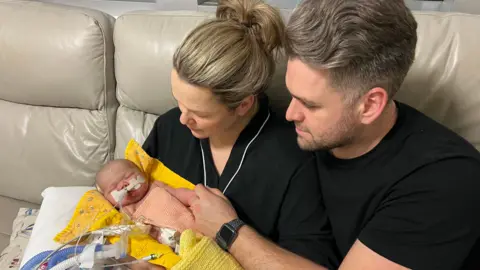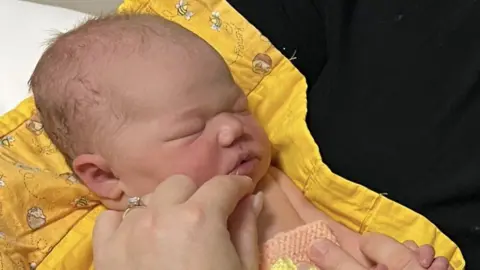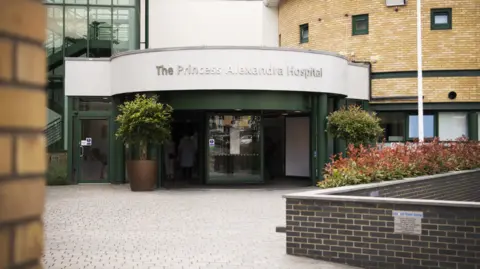Earlier C-section could have saved baby - coroner
 John Fairhall/BBC
John Fairhall/BBCA baby who died three days after birth would have survived if her mother had been offered a caesarean section, a coroner has said.
Emmy Russo was delivered at Princess Alexandra Hospital in Harlow but died on 12 January 2024.
Mother Bryony Russo told an inquest at Essex Coroner's Court that her requests for a C-section were "laughed off" during the hours she was there in labour.
The hospital's deputy chief executive said "we sincerely apologise" to the family.
Assistant coroner for Essex, Thea Wilson, said there were five missed opportunities to offer Ms Russo a C-section, and that Emmy's chances would have been different had she been born an hour earlier.
"She would have been born in a better condition and on the balance of probabilities she would have survived," she said.
"There was a failure to respond adequately to the request for a C-section"
 Family handout
Family handoutMs Russo's pregnancy was classed as low-risk and she was at 41 weeks and three days gestation when she went into labour and turned up at hospital.
She had called in advance and told staff she had found what appeared to be meconium (the baby's excrement) in her pants.
It was seven hours after arriving that she was first seen by a doctor and given an ultrasound.
Ms Wilson said that Ms Russo should have been seen as soon as she arrived.
The coroner was told staff did not spot an irregular heartbeat on the device used to monitor the baby.
Emmy was eventually delivered by emergency C-section about 11 hours after her mother arrived at hospital.
 Family handout
Family handoutIndependent expert obstetrician Teresa Kelly had told the coroner there was enough evidence "this baby wasn't coping with labour" and staff should have acted sooner.
Meconium the consistency of "toothpaste" was also found in her waters at hospital, the inquest heard, and Ms Kelly said a full holistic review of her care should have been carried out.
Giving evidence, midwife Megan Fletcher defended her decision not to escalate concerns to a more senior doctor, saying she was trying to avoid any further "invasive procedures".
 Princess Alexandra Hospital NHS Trust
Princess Alexandra Hospital NHS TrustAfter Emmy was born, no heartbeat could be detected and she had to be resuscitated before being transferred to Addenbrooke's Hospital in Cambridge.
Ms Wilson said Emmy's primary cause of death was an acute hypoxic brain injury, and that placental disruption was a secondary cause.
Phillippa Greenfield, the director of child health and women's services at the hospital, admitted a C-section should have been considered at the point when the foetal heartbeat decelerated.
She said "we don't refuse C-sections, if that is a woman's choice" but said the hospital was reviewing how to facilitate C-sections for women who requested it later in their pregnancy journey.
"This inquest has provided us with an opportunity to evaluate whether there should be a more structured process around that," she told the coroner.
Staff now received a day of training every year regarding foetal monitoring, she added.
After the inquest, chief nurse and deputy chief executive Sharon McNally said: "We recognise the coroner's findings and we sincerely apologise to baby Emmy's family.
"The safety of women, babies and families when receiving maternity care is our absolute priority and we ensure that learning from any incident is part of our focus on continuous improvement."
If you have been affected by this story or would like support then you can find organisations which offer help and information at the BBC Action Line.
Follow Essex news on BBC Sounds, Facebook, Instagram and X.
